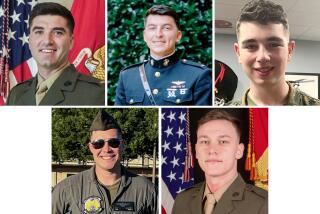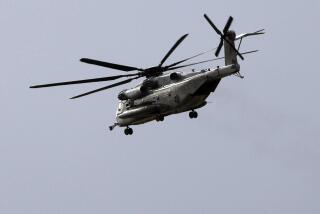Lawyers Defend Marines in Raid
- Share via
SAN DIEGO — Attorneys for Marines being investigated for possible war crimes in the deaths of 24 Iraqis in Haditha said Sunday that their clients did nothing wrong and were following the military’s rules on how to combat armed insurgents hiding inside homes.
“There will be no proof that these Marines intentionally killed civilians,” attorney Neal Puckett said. “To call this a massacre is completely groundless.”
The account of Puckett and other attorneys of what happened Nov. 19 in the town beside the Euphrates River differs sharply from what Iraqi survivors have told reporters. Those witnesses have said that after a roadside bomb killed one Marine and injured several more, other Marines rampaged from house to house, rounding up civilians and killing them without provocation.
But the attorneys, speaking this weekend to several news outlets, said the Marines were following established rules of engagement by tossing fragmentation grenades into homes where insurgents were suspected of hiding, and then following up with blasts of M-16 fire.
“I believe the real question is not whether the conduct of these young guys was appropriate,” said Gary Myers, among the other attorneys interviewed by The Times, “but rather if those who established the rules of engagement acted appropriately in defining those rules.”
The Marines, he said, went through the doors of homes “with no idea what they were facing.”
Myers would not reveal the name of his client.
Puckett, who represents Staff Sgt. Frank Wuterich, 26, the senior enlisted man on the scene, said the Marines were in pursuit of insurgents who were thought to have detonated the bomb that killed Lance Cpl. Miguel Terrazas and then fired at troops.
Puckett said the Marines went into one home looking for insurgents and then, suspecting that the fighters had fled out a back door, went into a second home. In both cases, Marines were expecting to be met by gunfire.
“You’re attempting to kill people who are threatening you,” Puckett said. “That innocent people were killed is regrettable, but now to have people, in hindsight, say, ‘Well, I would have done things differently,’ is wrong. Unless you were on the ground that day, you can’t judge.”
Wuterich is the only Marine of a dozen under investigation whose name has been revealed.
His attorney noted that Wuterich was promoted after the incident and that his fitness evaluation praised his leadership in response to the attack that killed Terrazas. It was his first combat experience, Puckett said.
Iraqis in Haditha insist the Marines were screaming in anger when they stormed the houses and that they gunned down children, women and an elderly man in a wheelchair, knowing that they posed no threat.
One woman told The Times late last month that the Marines herded men inside a building and killed them and that they also ordered four men out of a taxi and killed them.
But Puckett and the other attorneys say these accounts are inaccurate and that the fatal shots were fired either during the storming of the houses or at male Iraqis fleeing the bombing of the Humvee that killed Terrazas.
Two investigations are underway into the incident, which involved a dozen Marines from the 3rd Battalion, 1st Regiment, 1st Marine Division based at Camp Pendleton.
The battalion was on its third tour in Iraq.
One investigation, carried out by an Army major general, is looking into whether a cover-up hid the fact that women and children were among those killed and that the Iraqis were not killed by a bomb blast or crossfire.
A second inquiry, by the Naval Criminal Investigative Service, is looking at whether criminal charges should be filed, a decision that rests with a general at Camp Pendleton.
Pictures of the dead bodies taken by a Marine intelligence unit have convinced investigators that the Iraqis were shot at close range, some “execution-style,” and that charges including murder and dereliction of duty would be appropriate.
But defense attorneys are expected to argue that without autopsies, no such determination can be made. Military officials are seeking to persuade families to allow the bodies to be exhumed but, so far, have been rebuffed.
After the incident, the military paid $38,500 to the families of the dead.
One Marine in the unit who has spoken publicly about the incident, Lance Cpl. Roel Ryan Briones, of Hanford, Calif., did not witness the killings, but in an interview with The Times last month, he described photographing and carrying away the bodies of victims “from little babies to adult males and females,” an experience that left him traumatized.
Marines who have served in Iraq say that clearing a building is among the most dangerous of assignments. Insurgents have learned to wait inside for Marines and then fire as the Americans burst in.
Marines, in reaction, have the phrase: “Why send in a Marine when you can send in a bullet?” A fragmentation grenade is a powerful weapon that can kill or stun an enemy, but also creates smoke that can hinder visibility.
Officials familiar with the investigation into the Haditha killings say that it is not sufficient for the Marines to say they felt that insurgents were hiding inside the homes.
“Every day in Iraq, Marines show enormous restraint, and so just to say, ‘I thought there was an insurgent inside’ is not good enough,” said an official close to the investigation and familiar with military tactics in Iraq. “We tell them over and over: Use your brain before you use your weapon.”
An initial report from the Marine Corps said the Iraqis had been killed by an insurgent bomb. That account remained largely unchallenged until Time magazine began an investigation.
Puckett said much of the controversy may have begun with the erroneous explanation given to the media.
He said he was unsure of the origin of the bomb-blast explanation for the killings but that it did not come from Marines on the scene.
“It didn’t come from my guys,” he said.
More to Read
Sign up for Essential California
The most important California stories and recommendations in your inbox every morning.
You may occasionally receive promotional content from the Los Angeles Times.










